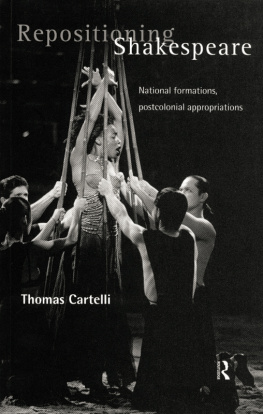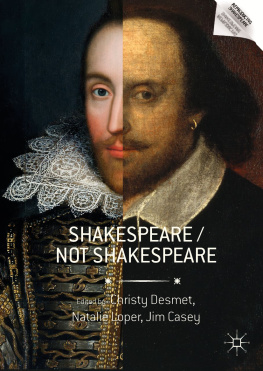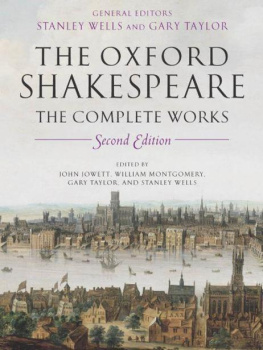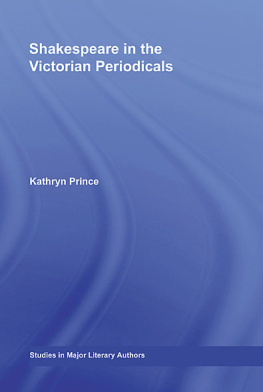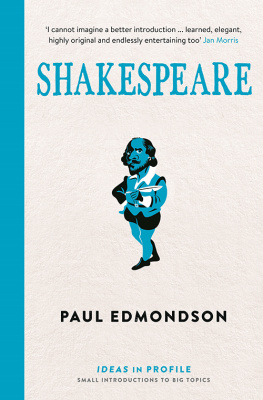Cartelli - Repositioning Shakespeare
Here you can read online Cartelli - Repositioning Shakespeare full text of the book (entire story) in english for free. Download pdf and epub, get meaning, cover and reviews about this ebook. City: London, year: 1999, publisher: Taylor and Francis;Routledge, genre: Politics. Description of the work, (preface) as well as reviews are available. Best literature library LitArk.com created for fans of good reading and offers a wide selection of genres:
Romance novel
Science fiction
Adventure
Detective
Science
History
Home and family
Prose
Art
Politics
Computer
Non-fiction
Religion
Business
Children
Humor
Choose a favorite category and find really read worthwhile books. Enjoy immersion in the world of imagination, feel the emotions of the characters or learn something new for yourself, make an fascinating discovery.
Repositioning Shakespeare: summary, description and annotation
We offer to read an annotation, description, summary or preface (depends on what the author of the book "Repositioning Shakespeare" wrote himself). If you haven't found the necessary information about the book — write in the comments, we will try to find it.
Cartelli: author's other books
Who wrote Repositioning Shakespeare? Find out the surname, the name of the author of the book and a list of all author's works by series.
Repositioning Shakespeare — read online for free the complete book (whole text) full work
Below is the text of the book, divided by pages. System saving the place of the last page read, allows you to conveniently read the book "Repositioning Shakespeare" online for free, without having to search again every time where you left off. Put a bookmark, and you can go to the page where you finished reading at any time.
Font size:
Interval:
Bookmark:
Repositioning Shakespeare offers a far-reaching assessment of how the Bard has been appropriated within postcolonial contexts, especially in the United States. Thomas Cartelli explores how Shakespeare is repositioned as postcolonial cultures seek to renegotiate Shakespeare's standing as a privileged site of authority within their own national formations.
Cartelli provides innovative readings of texts and events that position themselves in relation to Shakespeare, such as:
polemical essays by Walt Whitman
the nineteenth-century play, Jack Cade, commissioned and staged by the first major American Shakespearean actor
an essay on labor-management reform by social activist Jane Addams
novels by Aphra Behn,  wa Thiong'o, Michelle Cliff, Tayeb Salih, Nadine Gordimer, and Robert Stone
wa Thiong'o, Michelle Cliff, Tayeb Salih, Nadine Gordimer, and Robert Stone
the 1849 Astor Place Riot
films by James Ivory and Gus Van Sant
a Shakespeare tercentenary masque performed on the campus of the City College of New York in 1916.
Repositioning Shakespeare makes an original contribution to debates about the cultural uses of Shakespeare, as well as to the question of what counts as postcolonial.
Thomas Cartelli is Professor of English at Muhlenberg College. He is the author of Marlowe, Shakespeare, and the Economy of Theatrical Experience, which was awarded the 1991 Hoffman Prize for Distinguished Publication on Christopher Marlowe.
appropriations

London and New York
First published 1999
by Routledge
2 Park Square, Milton Park, Abingdon, Oxon, OX14 4RN
Simultaneously published in the USA and Canada
by Routledge
270 Madison Ave, New York NY 10016
Transferred to Digital Printing 2009
1999 Thomas Cartelli
Typeset in Baskerville by Routledge
All rights reserved. No part of this book may be reprinted or reproduced or utilized in any form or by any electronic, mechanical, or other means, now known or hereafter invented, including photocopying and recording, or in any information storage or retrieval system, without permission in writing from the publishers.
British Library Cataloguing in Publication Data
A catalogue record for this book is available from the British Library
Library of Congress Cataloging in Publication Data
A catalogue record for this book has been requested
ISBN 0-415-19134-3 (hbk)
ISBN 0-415-19498-9 (pbk)
Publisher's Note
The publisher has gone to great lengths to ensure the quality of this reprint but points out that some imperfections in the original may be apparent.
TO MY MOTHER AND IN MEMORY
OF MY FATHER
PART I
Democratic vistas
PART II
Prospero's books
PART III
The Othello complex
This book had its start in the essay, Prospero in Africa, that was first published in 1987 in Shakespeare Reproduced and is reprinted in revised form here. An opportunity to build upon this piece was provided when the Shakespeare Association of America invited me to deliver a paper on Shakespeare and postcolonialism at its annual meeting in Kansas City in 1992. The result, After The Tempest Shakespeare, Postcoloniality, and Michelle Cliff's New, New World Miranda, was later revised for publication in Contemporary Literature, Volume 36, No. 1 (1995), and has been once more revised for inclusion here as a companion-piece to Prospero in Africa. It appears by permission of the University of Wisconsin Press and the Board of Regents of the University of Wisconsin System.
I might never have heard of Michelle Cliff were it not for my long-time friend and colleague, Jim Bloom. Jim later successively acquainted me with Percy MacKaye's Caliban by the Yellow Sands, Jane Addams's A Modern Lear, and Robert Stone's Children of Light, while adding immeasurably to my understanding of Nadine Gordimer's My Son's Story. Jim also offered to read the entire manuscript, which he did with his usual impatience for slack thinking and pretentiousness. I owe him the store.
An early version of Chapter 1 was presented at the 1994 annual meeting of the SAA in Albuquerque in a session on Shakespeare and Democracy which I organized with Michael Bristol. The chapter on Othello and Oroonoko owes mightily to earlier work done on these texts by Margie Ferguson among others, and not a little to the resources of the Folger Library The subject of Chapter 7, Tayeb Salih's Season of Migration to the North, was first brought to my attention by Michael Neill during our own season together at the Folger, though my primary debt here is to Jyotsna Singh, whose essay on the novel helped show me what more might be done with it.
What Jim Bloom has been to the American studies section of this booksource, resource, and inspirationAnia Loomba has been, in a less obvious way, to its Third World postcolonial side, though more in the way of conscience, articulator, and example. She sets the standard for intelligence, honesty, and rigor in this field where Shakespeare and postcoloniality cross.
Others who have heard or read portions of the book, and have commented on them in one way or another, include Mary Fuller, Copplia Kahn, William Carroll, James Shapiro, Barbara Bowen, Tom Berger, John Drakakis, Martin Orkin, members of the Columbia University Shakespeare Seminar, and my wife Jackie Miller. I talked through much of this material with Alan Sinfield, Jonathan Dollimore, and Nick Visser at a conference in Johannesburg hosted by Martin Orkin in the summer of 1996. Thanks are due to Alan for practical advice regarding circulation of the manuscript, and to Nick Visser for his intellectual generosity and boundless hospitality. Nick's untimely death leaves us all diminished.
I owe special debts of gratitude to Terry Hawkes, who encouraged me to submit the project to Routledge and became its first official reader, and to Talia Rodgers, whose enthusiasm for my writing helped me keep the faith. Sophie Powell has been an indefatigable facilitator and correspondent, and patient audience for my anxieties.
Muhlenberg College has been unusually supportive of me and my projects. Much of the work I've done on this book has been underwritten by the year's leave I enjoyed as Class of '32 Research Professor, a series of generous summer research grants, and a crucial sabbatical leave in the spring of 1996. Thanks in particular to Curtis Dretsch for sending me to South Africa that summer.
I've taken more time away from my family to complete this book than should be allowable. I promise to return what I owe with interest to Philip and Gregory.
A final word of thanks to Harriet and Israel Miller, and to Carol Proctor, who in different ways continue to make many things possible.
Lines from E.K. Brathwaite's Didn't He Ramble are drawn from The Armants, London: Oxford University Press, 1973. They are quoted by permission of Oxford University Press.
Passages from  wa Thiong'o's A Grain of Wheat, London: Heinemann, 1968, are reprinted by permission of Heinemann Educational Publishers, a division of Reed Educational & Professional Publishing Ltd.
wa Thiong'o's A Grain of Wheat, London: Heinemann, 1968, are reprinted by permission of Heinemann Educational Publishers, a division of Reed Educational & Professional Publishing Ltd.
Passages from Season of Migration to the North by Tayeb Salih, translated by Denys Johnson-Davies, are reprinted with permission of Lynne Rienner Publishers, Inc.
Font size:
Interval:
Bookmark:
Similar books «Repositioning Shakespeare»
Look at similar books to Repositioning Shakespeare. We have selected literature similar in name and meaning in the hope of providing readers with more options to find new, interesting, not yet read works.
Discussion, reviews of the book Repositioning Shakespeare and just readers' own opinions. Leave your comments, write what you think about the work, its meaning or the main characters. Specify what exactly you liked and what you didn't like, and why you think so.

